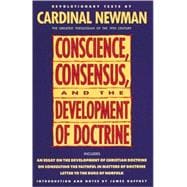"Certainly, if I am obliged to bring religion into after-dinner toasts (which indeed does not seem quite the thing), I shall drink -- to the Pope, if you please -- still, to Conscience first, and to the Pope afterwards."
--John Henry Cardinal Newman
In the works collected here, including An Essay on the Development of Christian doctrine, A Letter Addressed to His Grace the Duke of Norfolk, and On Consulting the Faithful in Matters of Doctrine, John Henry Cardinal Newman, the great nineteenth-century English theologian, debunks a few Catholic myths:
Myth #1: The teaching of the Catholic Church on faith and morals has never changed and never will change. Not so, this brilliant scholar says. For just as each era has new ways of understanding, so, too, must the Catholic Church always change in its understanding of faith and morals.
Myth #2: Catholics have to do whatever the Pope says. To the contrary, according to Newman's famous quip on after-dinner toasts, the ultimate obligation of Catholics is to conscience, not the Pope.
Myth #3: It's the bishops who teach, the laity who follows. Newman turns this notion upside down: The laity, he says, are the source and final seal of the church's teaching; thus the bishops must listen to them.
Never before collected in one volume, these classic works reveal Newman at his eloquent best as he speaks to the religious crises of our time.








